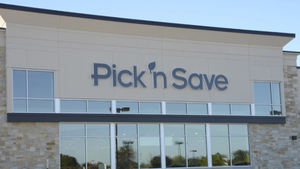SURPRISE GREETS RITE AID DECISION TO DROP BID FOR REVCO
WASHINGTON (FNS) -- Rite Aid's decision to drop plans to acquire Revco D.S. came as a surprise to many in the supermarket industry. Several pharmacy executives interviewed thought the merger eventually would be approved, even though the Federal Trade Commission was trying to block it. And some still feel it may."I wouldn't be surprised if [Rite Aid] came back in a few months with another plan, one
JOANNA RAMEY Additional reporting: CAROL ANGRISANI
WASHINGTON (FNS) -- Rite Aid's decision to drop plans to acquire Revco D.S. came as a surprise to many in the supermarket industry. Several pharmacy executives interviewed thought the merger eventually would be approved, even though the Federal Trade Commission was trying to block it. And some still feel it may.
"I wouldn't be surprised if [Rite Aid] came back in a few months with another plan, one in which they wouldn't acquire as many stores," said a pharmacy executive who did not want to be identified. "I don't feel that any deal is a done deal." Rite Aid, Camp Hill, Pa., withdrew its $1.8 billion tender offer to acquire Revco, Twinsburg, Ohio, on April 24. The announcement came a day after the FTC restated plans to block the acquisition in court.
Given that federal regulatory officials didn't block any of the recent mergers of drug makers with third parties such as pharmacy benefit management companies, industry officials are wondering why the Federal Trade Commission weighed in on the drug store acquisition.
Questioned on the issue during the Food Marketing Institute's Supermarket Pharmacy Conference in San Diego April 21 to 23, pharmacists said they had expected the FTC to approve the merger.
"There are other companies like Walgreens doing that kind of volume," said Cleve Schwenke, pharmacy director at Haggen Inc., Bellingham, Wash.
Even though retail pharmacies are in a different channel than drug makers and benefit companies, market concentration
in the delivery of pharmaceuticals is still an issue to those in the retail industry.
"Clearly, you have to have size to compete in today's marketplace, but we wonder why in the FTC's mind that should be allowed to occur broadly in other areas of pharmaceutical delivery except in the case of providers," said Lucinda Maine, senior director of pharmacy affairs at the American Pharmaceutical Association here. "We think that is unfair."
The FTC announced its legal challenge of the Revco-Rite Aid merger April 17, citing the marriage would result in substantially reduced competition for prescription drugs sold in retail stores in several areas. These include Ohio, Indiana, Maryland, Pennsylvania, Virginia, West Virginia, North Carolina, South Carolina and New York.
"If allowed to proceed, the combined Rite Aid-Revco firm would be the dominant pharmacy chain in numerous Eastern and Midwestern metropolitan areas," said George S. Cary, deputy director of the FTC's Bureau of Competition. "Rite Aid-Revco would have significantly more pharmacy locations than its closest competition, and would have the ability to increase prices and harm consumers."
Ohio was pointed to by sources as an example of the impact the merger could have on a market. In that state, Rite Aid could increase its market share from 14% to 31%, while its closest competitor, Kroger Co., would remain at a 6% share.
In a press statement, Rite Aid Chairman and Chief Executive Officer Martin Grass criticized the FTC, saying its efforts to block the merger were unwarranted.
"It is apparent to us that the FTC has never been interested in reviewing the facts surrounding our intended merger with Revco in an impartial manner," he said. "Despite the facts presented that proved this transaction would be pro-consumer, the FTC kept changing the rules of negotiation." FTC officials were unavailable to comment on Grass' press statement.
Meanwhile, the National Association of Chain Drug Stores, Alexandria, Va., of which Rite Aid and Revco are members, also cited the FTC's approval of drug and benefit companies in criticizing the agency's move to block the merger.
Regarding Rite Aid's decision to withdraw its offer, Ronald Ziegler, NACDS president, said, "We do not believe that the FTC is sending any signal indicating absolute opposition to consolidation in this industry NACDS looks forward to working with the FTC to provide information on the impact that vertically integrated PBM structures and other market forces are having on the retail pharmacy marketplace and the customers served by America's chain drug stores." If the merger went through, Rite Aid would become the largest drug chain in the country, with annual sales at a projected $11 billion. It would operate about 4,500 stores in 22 Eastern states and Washington.
However, supermarket pharmacy executives attending the FMI meeting didn't appear too concerned about the competitive implications of the merger.
"It won't adversely affect supermarkets that are successful with synergies in nutrition and pharmacies. If we have that, it doesn't matter how many stores a competitor has," said John Beckner, director of pharmacy, Ukrop's Super Markets, Richmond, Va.
About the Authors
You May Also Like






